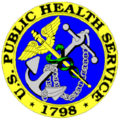Surgeon General of the United States
| Surgeon General of the United States | |
Incumbent: VADM Regina Benjamin since: 11 January 2010 | |
| First | John M. Woodworth |
|---|---|
| Formation | 29 March 1871 |
| Website | Official Website |
Contents[show] |
[edit] Selection and current office-holder
[edit] Responsibilities
[edit] History
- In 1964, Dr. Luther Leonidas Terry, M.D., published a landmark report saying that smoking may be hazardous to health[5], sparking nationwide anti-smoking efforts. Terry and his committee defined cigarette smoking of nicotine as not an addiction (the committee was made of largely physicians who themselves smoked). This error wasn't corrected for 24 years.[6]
- In 1986, Vice Admiral C. Everett Koop's report on AIDS called for some form of AIDS education in the early grades of elementary school and gave full support for using condoms for disease prevention.[7]
- In 1994, Vice Admiral Joycelyn Elders had spoken at a United Nations conference on AIDS. She was asked whether it would be appropriate to promote masturbation as a means of preventing young people from engaging in riskier forms of sexual activity, and she replied, "I think that it is part of human sexuality, and perhaps it should be taught."[8]
[edit] Service rank
[edit] Surgeons General of the United States
| # | Name | Photo | Term of Office | Appointed by | |
|---|---|---|---|---|---|






